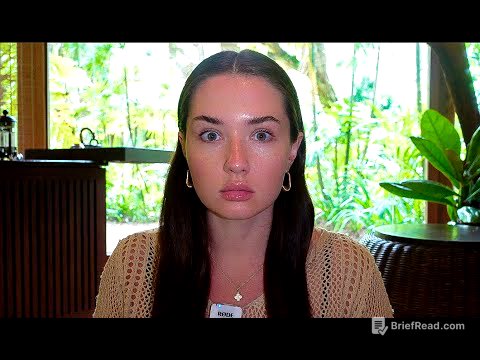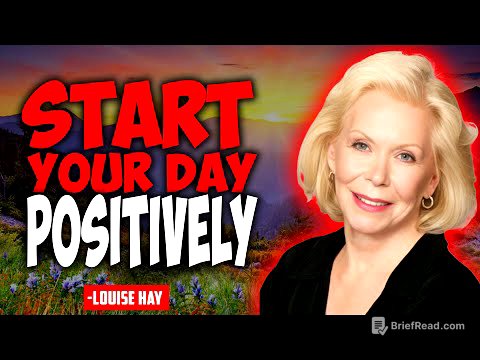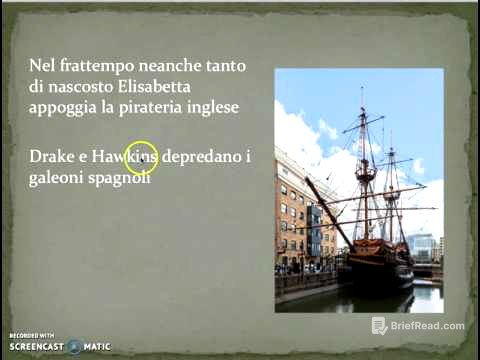TLDR;
This sermon explores the secret to establishing a strong church and family by focusing on love, discipleship, and adhering to divine principles. It emphasises the importance of individual responsibility, parental guidance, and the family unit as a foundation for societal transformation. The sermon also addresses the balance between law and grace, advocating for a life governed by internal principles rather than external enforcement.
- Love and discipleship are key to building a strong church and family.
- Parents play a crucial role in shaping their children's character and values.
- The family unit is a foundation for societal transformation.
- Balancing law and grace is essential for a fulfilling Christian life.
- Self-governance and adherence to principles lead to true freedom and dominion.
Introduction: The Value of One [0:18]
The sermon begins by highlighting the significance of celebrating the return or finding of even one lost individual, drawing parallels from parables about a lost son, sheep, and coin. It questions why the church doesn't react with the same urgency when someone is missing from the congregation as a parent would when their child doesn't return home. The speaker suggests that the carelessness of believers allows the enemy to take people from the church, questioning whether Christians are truly their brother's keeper.
Love as the Cure for Selfishness [2:37]
The speaker identifies selfishness and self-centeredness as the root of all sin, asserting that love is the cure. Love is defined as being other-person-minded, contrasting with the spirit of "Am I my brother's keeper?". True believers are indeed their brother's keeper, and a Christian is beyond human destruction in the context of witchcraft because they are sealed by the Holy Spirit. While the body can be harmed, the soul is beyond reach, except by those within the same spiritual "vault," such as a pastor who neglects their duty to care for their flock.
The Pastor's Responsibility and the Law of Love [5:21]
Pastors have a significant responsibility to give account for the souls of their congregation, similar to parents caring for their children. The law of love dictates loving God with all your heart, soul, and might, and loving your fellow man as yourself. Charity begins with one's neighbour, and the Great Commission starts in Jerusalem, emphasising the importance of caring for those closest to you before trying to save the world.
Family Relationships as a Foundation [7:50]
The speaker stresses the importance of family relationships, stating that treating siblings, fathers, and mothers within the family context teaches individuals how to interact in broader societal roles, including within the church and between ministries. Problems seen on a global scale, such as wars, often mirror conflicts within families.
Establishing a Church and the Family System [10:08]
Establishing a church begins with a marriage covenant and a church covenant, involving initiation ceremonies. The family system is crucial for maintaining care and support, similar to how families function within a nation. The ultimate goal is to build God's kingdom, a holy nation, by understanding and implementing God's plan.
The True Profession of a Believer: King and Priest [12:16]
The only true professions for a believer are king and priest, ruling society and ministering to others. This mindset prevents believers from becoming slaves to others, limiting their servitude to apprenticeships for mastering necessary skills. The knowledge required to pioneer is different from that needed to establish and sustain something, using the analogy of finding a spouse versus maintaining a marriage.
The Importance of Integrity and Faith in Relationships [13:51]
Sustaining a marriage requires integrity, not just empty promises. When a woman loses faith in her husband, the situation becomes dire, leading to nagging and cynicism. The speaker prays for understanding of God's principles for establishing a church and a family.
The Kingdom Plan: Families as Centres of Revival [15:27]
The plan of redemption involves families becoming God's centres for revival. Each family should aim to reach others, with each father becoming a pastor. God intended for children to be pastored within their families, and the failure to do so leads to expecting external sources to save one's children or neighbourhood.
The Family as an Earthly Picture of Heaven [18:20]
Families are earthly representations of heaven, with the Fatherhood of God being the origin of fatherhood on Earth. The relationship within the Trinity mirrors the relationship between husband and wife, resulting in offspring. Marriage is the union of two into one, reflecting the original creation of Adam, who contained both male and female within one entity.
The Covenant of Oneness and Generational Impact [20:29]
The idea of covenant is to return people to that original oneness in how they live their lives. Just as multiple mangoes come from one tree, individuals are part of a larger whole. The Holy Ghost and Jesus originated from the Father, and believers become one spirit with the Lord. The sins of the father affect children to the third and fourth generation because those generations are carried within.
The Nature of Adam and the Role of Parents [23:59]
Adam begat Seth in his own likeness and image, introducing a selfish nature. Children are born with this inherent selfishness, and parents have the job of cutting off this "Adamic" trait. Discipline and training are essential to circumcise the heart, preventing children from becoming outcasts.
The Battle Against Selfishness [28:20]
The speaker continues to emphasise the need to cut off selfishness, using the analogy of circumcising the foreskin of the heart. He contrasts the behaviours driven by selfishness with those driven by love, illustrating how selfishness can lead to destructive actions.
The Deceptive Nature of Satan and the Importance of Self-Crucifixion [30:09]
Satan is portrayed as charming and likeable, not the stereotypical monster. He appeals to self, and believers must crucify their self to resist temptation. The flesh, the world, and the devil are enemies, with the flesh (self) being the primary adversary.
The Family as the Strength of Sin and the Great Commission [33:51]
The fallen nature is transferred through families, making the family unit the strength of sin. Removing the family structure would force the devil to target individuals one by one. The Great Commission is directed towards families and nations, not just individuals.
The Redemptive Program and the Role of Men [35:13]
The redemptive program is a family program, with blood shed for families and nations. Untrained men are the biggest problem for families and nations, as women are often left to build families and churches without a solid foundation.
The Covenant with Noah and the Purpose of Children [36:58]
God's covenant with Noah included his entire household, and children are meant to continue the purpose and destinies of their parents. The speaker emphasises that his children are for signs and wonders, and through their seed, all families of the earth will be blessed.
Raising a Family of Kings and Priests [39:29]
David was called to raise a family of kings, and Aaron a family of priests. If one is looking for a job, they have failed as a parent. Children should be raised to be governors, presidents, bank owners, or ministers of the gospel.
The Covenant Seed and the Importance of Family Strongholds [40:50]
Children are a seed of the covenant, set apart for God. Families must become strongholds for Christ, with Christ as the head. Individuals should commit to serving the Lord with their entire household.
Commanding Children and Building Marriage According to the Book [42:14]
Parents have the power to command and discipline their children to follow the ways of the Lord. Marriages should be built according to scripture, not emotions or sentiments. The seed of the righteous shall be mighty, and it's crucial to disciple children to dominate in various environments.
The Order Established in Heaven and the Nature of God [45:16]
The order established in the house should reflect the order in heaven. God is a God of love, relationship, and family. He is a married man with a covenant with the Trinity, which is why marriage represents covenant relationships.
The Commitment to Sacrifice and the Role of Husbands [46:02]
Marriage involves a commitment to sacrifice oneself to help another person become whole and happy. Husbands should become reflections of the Heavenly Father, full of love and nourishment. Wives are members of the Trinity, not just angels.
The Importance of Law Before Grace and Divine Order [47:44]
Children need law before grace, as the law serves as a schoolmaster. Liberty without principles leads to chaos. Divine order involves serving and respecting elders, with children placed under governance until they learn self-governance.
The Three Types of Education and the Discipled Family [50:37]
Every human being needs moral/spiritual, mental/intellectual, and technical/vocational education. A family equipped in this way and bound by covenant can be used by God to affect nations.
Turning Families into Churches and Addressing Sins [52:50]
Singles should attach themselves to families and turn those places into churches. The sins of parents are seeds that become harvests in their children. Repentance should start with the father and mother, which purges the loins of the children.
The Pattern of Redemption and the Importance of Family Repentance [56:00]
The pattern of redemption involves the father taking responsibility and repenting, which quickly reboots the family. The first person to give their life to Christ in a family becomes a spiritual parent, incubating and interceding for the family.
The Family as a Platform for Righteousness and Discipleship [58:37]
The family has become a platform for the spread of sin, but it can also be a platform for the spread of righteousness and the redemptive program. Discipleship happens in small groups consistently over time.
Consolidation and the Role of Parents in Education [59:43]
Parents should be involved in their children's education, consolidating what they learn at school with teachings at home. If a child has to do without one, it's better to miss the school education than the home education.
The Moves That Shape Generations and the Importance of Foundations [1:00:58]
Parents must become what they want their children to be, as vices often show up in the children. There are no private investments or ancestral spirits; what is sown will be reaped.
Opening Houses for Church and Reaching Out to Neighbours [1:02:25]
Individuals should open their houses for church and start devotions, reaching out to their neighbours. City impact happens by moving from law to principles to freedom.
The Family Covenant and the Importance of Internalising the Law [1:03:38]
The family covenant has become a societal culture. God starts with an externally controlled system, then moves to internalising the law in people's hearts and minds through discipleship.
Liberty Restrained by Values and Principles [1:05:07]
God's plan is liberty restrained by values and principles. American liberty without restraint is like a car speeding without a driver, while Islamic order is like a car being pushed from the outside. Christianity is a carriage driven by a driver from the inside.
The Stages of Development and the Role of Governors [1:08:11]
Children need governors until they reach the time appointed by the father. Jesus brought an end to the Moses system of control, but nations at the infancy stage need an iron hand to establish order.
Building a Church and Leaving with Liberty [1:11:08]
To build a church, one must first establish laws and guidelines, then leave discipled people with liberty. Teenagers should not be left without rules and order.
Training Elephants and the Schoolmaster of the Law [1:11:59]
The training of elephants, starting with external restraints, mirrors how God gave the law before grace. The law is the schoolmaster that leads to discipleship.
Redemption from the Law and Making Prayer a Habit [1:12:56]
Jesus redeemed those under the law so they might receive adoption as sons. To make prayer a habit, it must be enforced from the outside first, then internalised.
Self-Governing People and the Key to Societal Change [1:14:45]
A self-governing person is entrusted with leadership and dominion. Any area where one fails to live by principles requires a sterner influence. Mastering how to change human beings is the key to changing society.






![Peppa Pig - Granny and Grandpa's Attic (42 episode / 2 season) [HD]](https://wm-img.halpindev.com/p-briefread_c-10_b-10/urlb/aHR0cDovL2ltZy55b3V0dWJlLmNvbS92aS9pWmltUlJDU3h6SS9ocWRlZmF1bHQuanBn.jpg)


